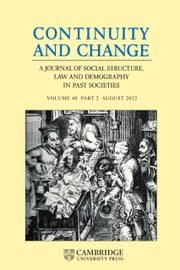Article contents
Social organization and property reform in nineteenth-century rural Mexico
Published online by Cambridge University Press: 07 July 2004
Abstract
In spite of Mexico's numerous efforts at liberal land reform and privatization in the nineteenth century, Totimehuacán (Puebla) maintained significant continuity in land-holding on a family basis. This undermines confidence in the pauperization hypothesis, the view that privatization necessarily dispossessed the indigenous peasantry. Mechanisms of social control and dispute resolution did change, and particular groups such as women and children lost an important defence in property matters. The effect of legislative changes was protracted, however, and mediated by the customary role of patronym groups, an issue which most other studies have ignored. The article concludes that the impact of property reform on women cannot be understood apart from customary, local forms of social organization.
- Type
- Research Article
- Information
- Copyright
- 2004 Cambridge University Press
- 1
- Cited by


